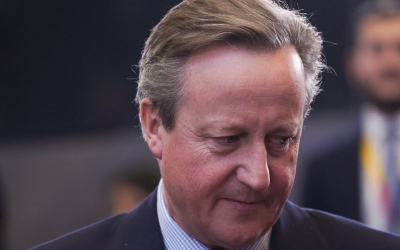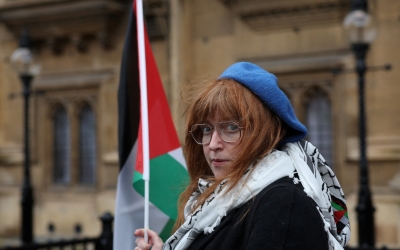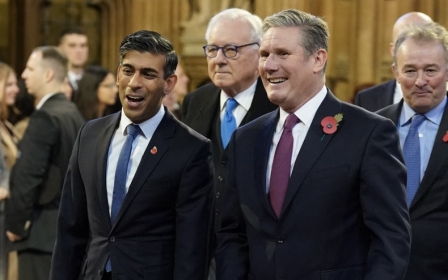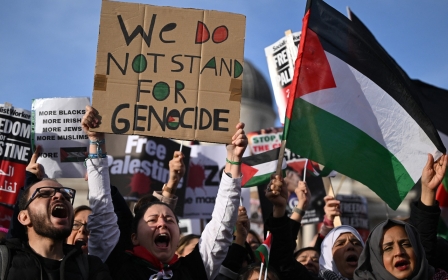War on Gaza: The UK government's cynical manipulation of Jewish fears
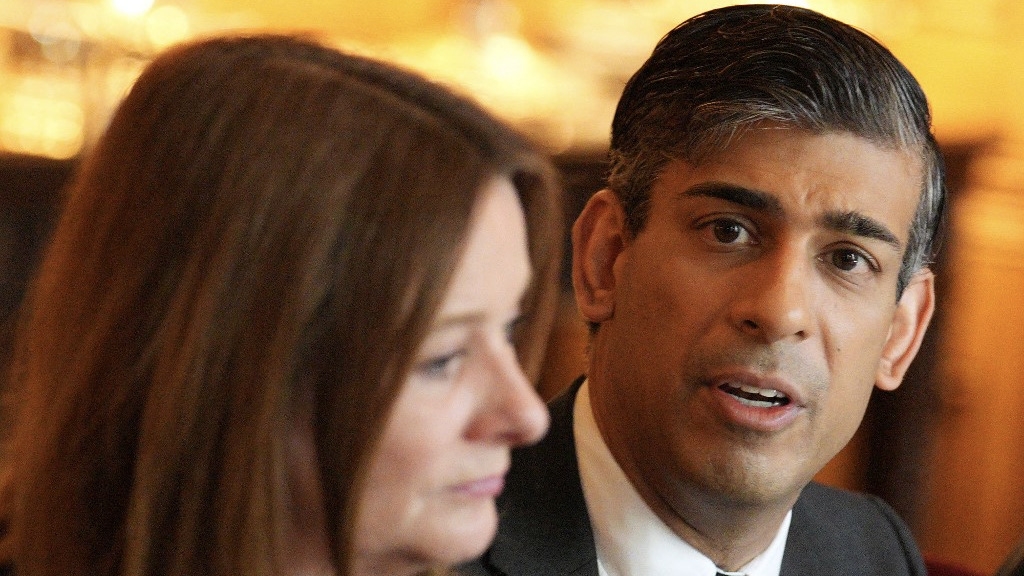
Listening to UK government ministers, one could be forgiven for concluding that the sole purpose of the encampments now proliferating on campuses across the country is the harassment and persecution of Jews.
Their protest against genocide in Gaza and their demands that universities divest from an apartheid regime are all but obscured by the declarations of Prime Minister Rishi Sunak and Gillian Keegan, the education secretary, that antisemitism will not be tolerated and “we will not stand by as Jewish students suffer”. (Note not if but as).
Threats were made in advance to back a "police crackdown" and vice chancellors were urgently summoned to a Cobra-style meeting in Downing Street. Given the government’s pro-Israel policy, it was hardly likely to welcome the protests, but this knee-jerk resort to anticipating and decrying antisemitism - based, as with the national demonstrations, on the flimsiest of evidence - reveals a longstanding pattern.
In November 2021, the UK, urged on by Israel, proscribed the political wing of Hamas as a terrorist organisation. This was announced, not by the foreign secretary, but by Home Secretary Priti Patel, justifying it as a “vital step towards protecting the Jewish community”. Why was a foreign policy decision placed so firmly within the domestic realm? Its contribution to the safety of Britain’s Jewish population was, at best, debatable.
Patel’s bizarre statement is part of a pattern whereby whenever Israel launched one of its regular assaults on Palestinians in Gaza, the UK government uttered a few mantras such as “Israel’s right to defend itself” and then swiftly diverted onto condemnation of antisemitism at home.
As the indescribable carnage inflicted on Gaza enters its eighth month and the government continues to equivocate on calling for a ceasefire, let alone restricting arms sales, this pattern is flashing up in neon lights.
Silencing criticism
Two elements underlie it: even naming either draws condemnation from those in power. One is how antisemitism has been instrumentalised by Israel apologists in the UK to besmirch and silence criticism of Israel.
The other is that Israel’s war crimes have a direct and pernicious effect on Britain’s Jews. Even to raise this is to be denounced, as Baroness Jenny Tonge found in a House of Lords debate earlier in 2021. Her suggestion that increased violence in the West Bank and Gaza might be linked to rising antisemitic incidents against innocent Jewish victims in the UK was met with vicious attacks from fellow peers, accusing her of victim blaming and worse.
Follow Middle East Eye's live coverage of the Israel-Palestine war
Figures from the Community Security Trust (CST) have pointed to rates of antisemitism soaring in direct proportion to assaults on Gaza. In 2021, the CST concluded that “trigger events in the Middle East impact diaspora Jewish communities, and the consequent rises in reported antisemitism in the UK show this”.
However, now that Gaza’s Palestinians are being subjected to a genocidal attack of unparalleled proportions, the rhetoric from both the UK government and the CST occludes the relationship between Israel’s actions and levels of antisemitism, choosing instead to divert blame onto those who protest against genocide.
Government statements about antisemitism, as well as in much of the mainstream media, consistently refer to heightened levels of antisemitism since the Hamas massacres of 7 October 2023. Israel’s attacks on Gaza are thus obscured.
Guardian commentator Jonathan Freedland recently claimed that “the biggest surge in anti-Jewish activity came immediately after the 7 October attacks, when Israelis were still reeling - still counting their dead and missing - and had scarcely responded at all.”
He added: “In the week following 7 October, CST recorded 416 anti-Jewish hate incidents, higher than any subsequent week. It indicates that it was celebration of Hamas’ attack, rather than anger towards Israel’s military response in Gaza.”
This argument is flawed and disingenuous because the bombardment of Gaza started in the immediate aftermath of the Hamas attack, indeed on the very same day.
Between October 7 and 12, Israel dropped 6,000 bombs on the densely inhabited territory – equivalent to the total number of air strikes on Gaza during the entire 2014 Gaza-Israel conflict.
Thus to claim that Israel had scarcely responded in that first week is grossly misleading.
Freedland employed this argument to back up his claim that “when Israel is in the news… it acts as a kind of bat signal, summoning either the antisemites from their caves or, more subtly, the antisemitic feelings that lurk even in the most seemingly blameless”.
In my opinion, like many Israel apologists, Freedland locates angry responses to Zionist aggression within endemic, immutable dark forces of antisemitism, and grossly understates the part played by Israel’s own actions. This in no way justifies blaming or attacking Jews for Israel’s actions, but it should surely not be taboo to refer to Israel’s contribution.
Victim narrative
The instant and vengeful Israeli response on 7 October, accompanied by blood-curdling genocidal threats, served to immediately activate those UK citizens who predicted only too accurately what was to be unleashed upon the people of Gaza.
The UK government - together with other western powers - effectively granted Israel carte blanche to commit atrocities in Gaza. Following the United States in opposing a ceasefire, it dismissed the International Court of Justice ruling of 26 January, and refused to review its arms supplies to Israel.
As the rates of death, injury and starvation mount up and the collusion of government and opposition front benches is increasingly exposed, so we see an intensification of bogus concerns about community relations and increasing vilification of the actions and motivations of Israel’s critics.
Peaceful protesters and students are antisemites, extremists and terrorist sympathisers, demonstrations are hate marches which undermine the social fabric and, according to Sunak, Britain is threatened from within by mob rule.
As claims of victimhood ring increasingly hollow, Israel’s apologists manipulate the fears of diaspora Jews in order to silence critics
Israel and Zionist organisations in the UK and elsewhere have already lost the argument. Popular support for Israel has largely relied on evoking victimhood - hard to do now given the magnitude of slaughter in Gaza and violent ethnic cleansing on the West Bank.
As claims of victimhood ring increasingly hollow, Israel’s apologists manipulate the fears of diaspora Jews in order to silence critics, including Israel's UK Ambassador Tzipi Hotovely's extraordinary claim in November that British Jews “feel like London is less safe during this war than Israel. They see the same jihadi ideology on the streets of London as in Gaza”.
Since the State of Israel - unlike its civilians who were murdered or kidnapped on 7 October - cannot plausibly be presented as a victim, its apologists have converted demands that it be prevented from slaughtering Palestinians and held to account for its war crimes into a form of victimhood by focusing on the fears of Jewish citizens.
In this way, a victim narrative is perpetuated.
The distraction away from a foreign policy complicit in war crimes and plausible genocide onto exaggerated claims of community division and conflict was exposed in the House of Commons on 21 February when both government and Labour opposition tried to abort a ceasefire vote that was not to Israel’s liking.
The Speaker allowed Labour to put forward a weaker motion on the grounds of potential dangers to its MPs from their constituents if they voted against the original SNP motion. This squalid attempt to rescue Labour leader Keir Starmer not only showed callous disregard for the people of Gaza, but reinforced a phoney narrative about imminent danger of civil strife and violence at home.
Erosion of civil liberties
Two further points need to be made about the government’s cynical manipulation of community tensions.
First, we do not need to deny that antisemitism is on the rise to see how the government is using it as a distraction from the increasing disconnect between its slavish support for Israel and the views of the vast majority of the UK population who back an immediate ceasefire.
Not only does the government refuse to engage with these voices; it uses the disconnection thus exposed as an opportunity to erode precious civil liberties.
Second, it is obvious that in responding to a largely bogus “moral panic” about social disorder, the government favours one group of citizens over others.
Choosing to address racism only in relation to Britain's Jewish citizens will do little to secure their safety. Meanwhile, Britain's Muslims feel that their own experiences of racism and their outrage at what is being done to Gaza are not taken seriously.
Persistent characterisation of peace marches and student protests as antisemitic is little short of irresponsible. It elides the crucial difference between "feeling unsafe" and "being unsafe".
For students who support Israel to feel uncomfortable and marginalised because of the strength of protest against genocide is understandable, but it is not the same as being unsafe.
Protest organisers often emphasise the fact that their demonstrations or encampments include significant numbers of Jews. Whilst entirely accurate, this will not allay the attackers because their concern is not the safety of diaspora Jews but the protection of Israel.
Protests “against antisemitism” normally feature much waving of the Israeli flag. At one pro-Israel demonstration in London, a group of non-Zionist Hasidic Jews who stood and protested were abused and assaulted by Zionist Jews and had to be rescued by police.
The biggest divide in British society on Israel/Palestine is between those of all backgrounds and faiths who are morally outraged by the death and destruction perpetrated by Israel on the people of Gaza and those - including government, opposition and Zionist organisations - who continue to insist that Israel must never be held to account for any of its war crimes.
The views expressed in this article belong to the author and do not necessarily reflect the editorial policy of Middle East Eye.
Middle East Eye propose une couverture et une analyse indépendantes et incomparables du Moyen-Orient, de l’Afrique du Nord et d’autres régions du monde. Pour en savoir plus sur la reprise de ce contenu et les frais qui s’appliquent, veuillez remplir ce formulaire [en anglais]. Pour en savoir plus sur MEE, cliquez ici [en anglais].



